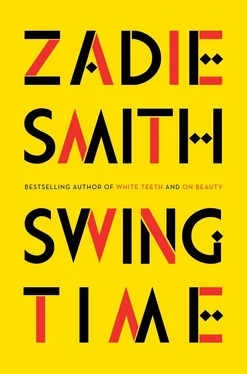Zadie Smith - Swing Time
Здесь есть возможность читать онлайн «Zadie Smith - Swing Time» весь текст электронной книги совершенно бесплатно (целиком полную версию без сокращений). В некоторых случаях можно слушать аудио, скачать через торрент в формате fb2 и присутствует краткое содержание. Город: NYC, Год выпуска: 2016, ISBN: 2016, Издательство: Penguin Publishing Group, Жанр: Современная проза, на английском языке. Описание произведения, (предисловие) а так же отзывы посетителей доступны на портале библиотеки ЛибКат.
- Название:Swing Time
- Автор:
- Издательство:Penguin Publishing Group
- Жанр:
- Год:2016
- Город:NYC
- ISBN:978-0-39956-431-4
- Рейтинг книги:4 / 5. Голосов: 1
-
Избранное:Добавить в избранное
- Отзывы:
-
Ваша оценка:
- 80
- 1
- 2
- 3
- 4
- 5
Swing Time: краткое содержание, описание и аннотация
Предлагаем к чтению аннотацию, описание, краткое содержание или предисловие (зависит от того, что написал сам автор книги «Swing Time»). Если вы не нашли необходимую информацию о книге — напишите в комментариях, мы постараемся отыскать её.
Dazzlingly energetic and deeply human,
is a story about friendship and music and stubborn roots, about how we are shaped by these things and how we can survive them. Moving from northwest London to West Africa, it is an exuberant dance to the music of time.
Swing Time — читать онлайн бесплатно полную книгу (весь текст) целиком
Ниже представлен текст книги, разбитый по страницам. Система сохранения места последней прочитанной страницы, позволяет с удобством читать онлайн бесплатно книгу «Swing Time», без необходимости каждый раз заново искать на чём Вы остановились. Поставьте закладку, и сможете в любой момент перейти на страницу, на которой закончили чтение.
Интервал:
Закладка:
“Boring how?”
“Oh, I should not say ‘boring,’ but I mean, you should see him and Musa together, they listen to these holy tapes all day long, they are very holy tapes, Musa is trying now to learn more Arabic, and I am also learning to appreciate them fully, at the moment they are still very boring for me — but when Bakary listens to them he weeps! He weeps and holds Musa in his arms! Sometimes I go to the market and come back and they are still hugging each other and crying! I never saw a bumster weep! Unless somebody stole his drugs! No, no, Bakary is very sensitive. It is really a heart matter. At first I thought: my mother is a learned woman, she taught me a lot of Arabic, I will be ahead of Bakary in my iman , but that is so wrong! Because it’s not what you read, it’s what you feel. And I have a long way to go before my heart is as full of iman as Bakary’s. I think a sensitive man makes a good husband, don’t you? And our mashala men — I should not call them that, Tablighi is the proper word — but they are so kind to their women! I didn’t know that. My grandmother always said: they are half big, they are crazy, don’t talk to these girly-men, they don’t even have jobs. Oh boy, she’s weeping every day. But she doesn’t understand, she’s so old-fashioned. Bakary is always saying, ‘There is a hadith that goes: “The best man is the one who helps his wife and children and has mercy on them.”’ And that’s how it is. So, if we go on these tours, on masturat , well, to avoid other men seeing us in the market, our men go themselves and do the shopping for us, they buy the vegetables. I laughed when I heard this, I thought: it can’t be true — but it’s true! My grandfather did not even know where the market was! This is what I try to explain to my grandmothers, but they are old-fashioned. They are weeping every day because he is a mashala— I mean, Tablighi. According to me, they are jealous in secret. Oh, I wish I could leave this place right now. When I went to be with my sisters I was so happy! We prayed together. We walked together. After lunch, one of us had to lead the prayer, you know, and one of the sisters said to me: ‘You do it!’ And so I was the Imam for the day, you know? But I wasn’t shy. Many of my sisters are shy, they say, ‘It is not for me to speak,’ but I really found out on this tour that I am not at all a shy person. And everybody listened to me — oh! People even asked me questions afterward. Can you believe it?”
“It doesn’t surprise me at all.”
“My topic was the six fundamentals. This is about how a person should eat? In fact, I am not observing them right now, because you are here, but they are certainly in my mind for the next time.”
This guilty thought led to another: she leaned forward to whisper something to me, her irresistible face set in a half-smile.
“Yesterday I went to the school TV room and we watched Esmeralda . I shouldn’t smile,” she said, and abruptly stopped, “but you especially know how I love Esmeralda , and I’m sure you would agree that nobody can rid themselves of all dunya things all in one go.” She looked down at her shapeless skirt. “Also my clothes will have to change, in the end, not just the skirt, everything from head to toe. But my sisters all agree it is hard at first because you get so hot and people stare, they call you ninja or Osama in the street. But I remembered what you said to me once when you first came here: “Who cares what other people think?” And this is a strong thought that I keep with me, because my reward will be in Heaven, where nobody will call me ninja because certainly those people will be on fire. I still love my Chris Brown, I can’t help it, and even Bakary still loves his Marley songs, I know because I heard him sing one the other day. But we will learn together, we are young. As I told you already, when we were on tour Bakary did all my chores for me, he went to the market for me, even when people laughed at him, he did this. He did my washing. I said to my grandmothers: did my grandfather ever wash even a sock for any of you in forty years?”
“But Hawa, why can’t the men see you in the market?”
She looked bored: I had asked the dullest question once again.
“When men look at women who are not their wife that is the moment Shaytan is waiting to rush in, to fill them with sin. Shaytan is everywhere! But don’t you even know that?”
I couldn’t listen to any more of it and made my excuses. But the only place I could go or knew how to get to in the darkness was the pink house. From some way down the road I could see all the lights were dead, and when I reached the door I found it hanging at an angle from a broken hinge.
“You in there? Can I come in?”
“My door is always open,” replied Fern from the shadows, in a sonorous voice, and we laughed at the same time. I came in, he made me tea, I regurgitated all the news from Hawa.
Fern listened to me rant, his head cast further and further back until his head-torch shone on the ceiling.
“I have to say it does not seem strange to me,” he said when I finished. “She works like a dog in that compound. She hardly leaves it. I imagine she is desperate, like any bright young person, to have her own life. Didn’t you want to get out of your parents’ house, at that age?”
“When I was her age I wanted freedom!”
“And you would consider her less free, I mean, touring Mauritania, preaching, than she is now, shut up at home?” He drew his sandal through the covering of red dust that had accumulated on the plastic flooring. “That’s interesting. It’s an interesting point of view.”
“Oh, you’re just trying to annoy me.”
“No, I never mean to do that.” He looked down at the pattern he had made on the floor. “Sometimes I wonder if people don’t want freedom as much as they want meaning,” he said, speaking slowly. “This is what I mean to say. At least, this has been my experience.”
We would argue if we carried on so I changed the subject and offered him one of the biscuits I had swiped from Hawa’s room. I remembered I had some podcasts saved on my iPod and, with one earbud each, we sat peaceably side by side, nibbling our biscuits and listening to accounts of these American lives, their minor dramas and satisfactions, their pleasures and irritations and tragicomic epiphanies, until it was time for me to go.
The next morning when I woke my first thought was Hawa, Hawa soon married, the babies that would surely follow, and I wanted to speak to someone who shared my sense of disappointment. I got dressed and went looking for Lamin. I found him in the schoolyard, going over a lesson plan under the mango tree. But disappointment was not his reaction to Hawa’s news, or not his first reaction — that was heartbreak. It wasn’t even nine in the morning and I had managed to break someone’s heart.
“But where did you hear this?”
“Hawa!”
He struggled to gain control of his face.
“Sometimes girls say they will marry someone and they do not. It’s common. There was a policeman…” He trailed off.
“I’m sorry, Lamin. I know how you feel about her.”
Lamin laughed stiffly and returned to his lesson plan.
“Oh no, you are mistaken, we are brother and sister. We have always been. I said this to our friend Aimee: this is my little sister. She will remember me saying this, if you ask her. No, I am just sorry for Hawa’s family. They will be very sad.”
The school bell rang. I visited classrooms all morning and for the first time got a feeling for what Fern had achieved here, in our absence, despite Aimee’s interference, and by working, in a sense, around her. The school office had all the new computers she had sent, and more reliable internet, which I could see, from their search histories, had been so far used exclusively by the teachers for two purposes: trawling Facebook and entering the President’s name into Google. Each classroom was scattered with mysterious — to me—3D logic puzzles and small handheld devices on which you could play chess. But these were not the innovations that impressed me. Just behind the main building, Fern had used some of Aimee’s money to create a garden in the yard, which I don’t remember him ever mentioning in our board meetings, and here all kinds of produce were growing, which belonged, he explained, to the parent body collectively, which — along with many other consequences — meant that when first period ended, half the school did not disappear to help their mothers on the farm, instead staying on site and tending to their seedlings. I learned that Fern, at the suggestion of the mothers in the PTA, had invited several teachers from the local majlis into our school, where they were given a room to teach Arabic and Koranic studies, for which they were paid a small fee directly, and this stopped another large portion of the school population disappearing at midday or spending a part of every afternoon doing domestic chores for these majli teachers, as they once had, in lieu of payment. I spent an hour in the new art room, where the youngest girls sat at their tables mixing colors and making hand prints — playing — while the laptops that Aimee had envisioned for them all had, Fern now confessed, disappeared en route to the village, no surprise, given that each one was worth twice any teacher’s yearly wage. All in all the Illuminated Academy for Girls was not that shining, radically new, unprecedented incubator-of-the-future I had heard so much about around Aimee’s dinner tables in New York and London. It was the “Loomy Academy,” as people called it locally, where many small but interesting things were happening, every day, which were then argued over and debated at the end of each week, in the village meetings, which led to further adaptations and changes, few of which I sensed Aimee ever knew or heard about, but to which Fern closely attended, listening to everyone in that strikingly open way of his, making his reams of notes. It was a functioning school, built by Aimee’s money but not contained by it, and whatever small part I had played in its creation, I now felt, like any minor member of the village, my own portion of pride in it. I was enjoying this warm feeling of achievement, walking back from the school garden to the headmaster’s office, when I spotted Lamin and Hawa under the mango tree, standing too close together, arguing.
Читать дальшеИнтервал:
Закладка:
Похожие книги на «Swing Time»
Представляем Вашему вниманию похожие книги на «Swing Time» списком для выбора. Мы отобрали схожую по названию и смыслу литературу в надежде предоставить читателям больше вариантов отыскать новые, интересные, ещё непрочитанные произведения.
Обсуждение, отзывы о книге «Swing Time» и просто собственные мнения читателей. Оставьте ваши комментарии, напишите, что Вы думаете о произведении, его смысле или главных героях. Укажите что конкретно понравилось, а что нет, и почему Вы так считаете.












